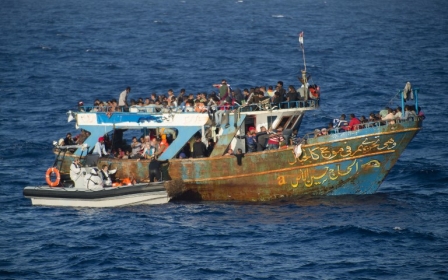At least 100 missing in Med as this year's death toll passes 4,000

At least 100 people are missing after a migrant boat capsized in the Mediterranean on Tuesday, a German NGO said, as the Italian coastguard confirmed that it had rescued 15 people off the coast of Libya.
The coastguard would only confirm that a merchant ship had gone to the aid of the stricken dinghy on Monday and that 15 people had been rescued, before being transferred to a patrol ship, a coastguard vessel.
"They are now being taken to Catania (in Sicily) and for the moment we cannot confirm any other news or numbers," a coastguard spokesman said.
It would be extremely unusual, if not unheard of, for traffickers to set off from Libya with as few as 15 people on the kind of vessel which is typically crammed with between 100 and 150 people.
More than 4,000 people are believed to have drowned in the Mediterranean attempting to cross to Europe this year, according to figures released on Monday by the United Nations' International Organisation for Migration.
The IOM said the death toll for the year to 13 November was 4,271, compared with 3,777 in the whole of 2015.
It said that 341,055 migrants and refugees had entered Europe by sea in 2016, mostly arriving in Greece and Italy.
Fears of a new major tragedy mounted as harrowing testimony emerged from another of the five rescues coordinated by the coastguard on Monday.
A total of 550 people were saved, according to the coastguard, while charity group SOS Mediterranee said six people had died during the operation its boat, the Aquarius, was involved in.
On Tuesday, MSF tweeted that the Aquarius had been involved in another rescue operation in which 129 people had been brought aboard from a rubber boat.
Speaking about Monday's rescue, Mathias Menge, coordinator of the rescue team, told the AFP news agency: "The survivors told us their boat had started taking on water two hours after leaving Libya.
"When the Aquarius arrived (more than seven hours later) it was full of water and starting to deflate. We did what we could but unfortunately six people lost their lives in this tragic incident."
As often happens, the approach of a rescue ship triggered a panic which ended with many of those aboard the dinghy in the water.
Menge said there had been 24 minors on the dinghy, including three children under five, and eight women.
One young boy was plucked unconscious from the water.
"He had inhaled fuel fumes and sea water but happily we got him in time," said Sarah Giles, one of the on-board doctors working for the Medecins Sans Frontieres charity.
"He was unconscious for two hours but we were able to stabilise him before he was evacuated by helicopter.
"It was a very difficult day for the medical team, we had to provide emergency treatment to many people in a critical condition.
"When they arrived on the deck, many of the survivors were traumatised, soaked in fuel and crying. They were so grateful to be saved."
Five bodies were recovered but the corpse of at least one drowned person spotted in the water could not be picked up.
Survivors were treated for hypothermia, intoxication by fuel fumes and severe burns.
"Nobody should have to endure such conditions," Menge said.
"This latest tragedy underlines once more the dangers of the Mediterranean and the pressing need to maintain search and rescue operations throughout the winter."
This year is already the deadliest on record for people trying to reach Europe with uncertainty about the situation in conflict-torn Libya fuelling a higher volume of departures in difficult weather conditions at the onset of winter.
Stay informed with MEE's newsletters
Sign up to get the latest alerts, insights and analysis, starting with Turkey Unpacked
Middle East Eye delivers independent and unrivalled coverage and analysis of the Middle East, North Africa and beyond. To learn more about republishing this content and the associated fees, please fill out this form. More about MEE can be found here.




